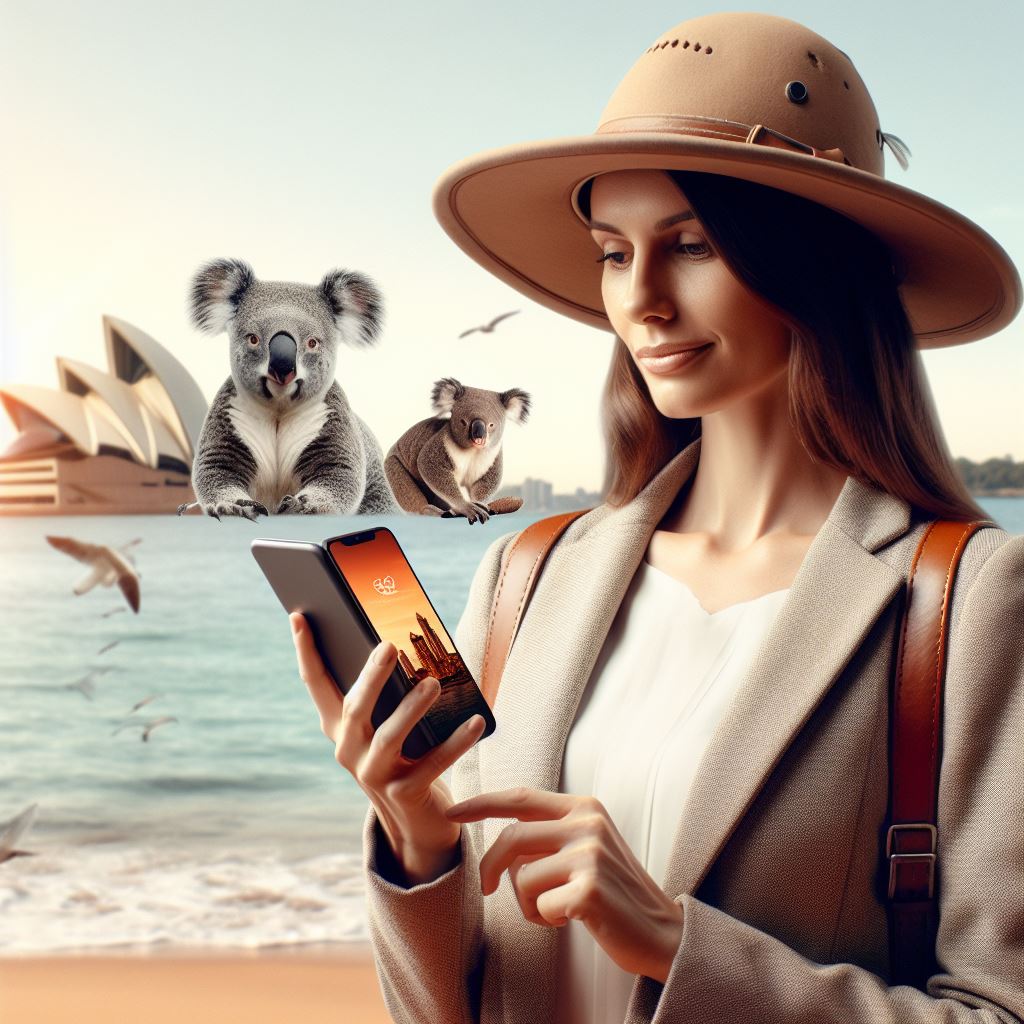Introduction
Social media has become an integral part of the modern digital era, impacting various industries.
Travel agents, in particular, have witnessed the growing influence of social media.
The importance of social media cannot be ignored in this day and age.
It has revolutionized the way people communicate, share information, and make decisions.
The travel industry is no exception to this trend.
Social media platforms like Facebook, Instagram, and Twitter have become popular channels for travel agents to connect with their target audience.
These platforms allow travel agents to showcase their services, engage with customers, and promote their offerings in a more engaging and interactive manner.
Social media has made it easier for travel agents to reach a wider audience and gain visibility in the crowded online space.
Customers can now explore destinations, read reviews, and even make bookings directly through social media platforms.
This level of convenience has significantly simplified the travel planning process.
Furthermore, social media has also provided travel agents with valuable insights and data.
They can now gather information about customer preferences, trends, and behavior through social media analytics.
This enables them to tailor their services and offerings to better meet the needs and desires of their target audience.
Basically, social media has had a profound impact on the travel industry, including travel agents.
Its importance in the modern digital era cannot be overstated.
Social media platforms have become essential tools for travel agents to connect with customers, promote their services, and gain a competitive edge in the market.
Embracing social media is no longer an option for travel agents; it is now a necessity for success in the industry.
Definition of a Travel Agent
A travel agent is an individual or company that assists individuals or groups in planning and arranging travel itineraries. They act as intermediaries between travelers and travel suppliers such as airlines, hotels, and tour operators.
Explanation of the role and responsibilities of a travel agent
- Professional Advice: Travel agents provide expert advice on destinations, accommodations, and transportation options based on their knowledge and experience.
- Customized Itineraries: They create personalized itineraries tailored to the specific needs and preferences of their clients, ensuring a hassle-free travel experience.
- Booking Assistance: Travel agents handle all the aspects of booking including flight reservations, hotel accommodations, transportation, and guided tours.
- Cost Savings: They have access to exclusive deals, discounts, and promotions, enabling travelers to save money on their travel expenses.
- Visa and Documentation: Travel agents assist in obtaining necessary travel documents such as visas, passports, and travel insurance, ensuring a smooth travel process.
- Problem Resolution: In case of any travel-related issues or emergencies, travel agents act as a point of contact and assist in finding solutions to ensure a seamless vacation.
Importance of travel agents in the travel industry
- Expertise and Knowledge: Travel agents possess extensive knowledge about various destinations, hotels, attractions, and travel trends, which helps them provide valuable guidance to travelers.
- Time-Saving: With access to multiple travel resources, travel agents save travelers hours of research and planning by streamlining the booking process.
- Personalized Service: Travel agents understand the unique needs and preferences of their clients, allowing them to create customized travel experiences.
- Industry Connections: Travel agents have established relationships with airlines, hotels, and tour operators, which grants them access to exclusive offers and perks.
- Destination Insights: They can provide insider tips and recommendations about local attractions, restaurants, and hidden gems, enhancing the overall travel experience.
- Safety and Security: Travel agents prioritize their clients’ safety by ensuring they have up-to-date information on travel advisories, health requirements, and security measures.
- Value for Money: Travel agents help travelers get the most value out of their budget by obtaining the best deals and helping them make informed decisions.
Generally, travel agents play a vital role in the travel industry by offering expert advice, personalized service, and cost-saving opportunities.
Their knowledge, connections, and attention to detail make them an invaluable resource for travelers seeking a memorable and stress-free vacation.
Utilizing the services of a travel agent can enhance the overall travel experience and provide peace of mind.
Read: How to Become a Travel Agent in Australia
Social Media Platforms and Their Impact on Travel Agents
When it comes to social media platforms, travel agents cannot ignore their significance in today’s digital world. Facebook, Instagram, and Twitter are among the most popular platforms that have a profound impact on travel agents and their businesses.
Overview of Popular Social Media Platforms
Facebook, with its massive user base of over 2.
8 billion monthly active users, offers a wide range of opportunities for travel agents to connect with potential clients.
Its user-friendly interface allows travel agents to share photos, videos, and promotional content, reaching a broader audience.
Instagram, known for its visually appealing content, is a go-to platform for travel inspiration.
With more than 1 billion active users, it has become an essential tool for travel agents to showcase stunning images and engage with travel enthusiasts.
Twitter, with its real-time updates and succinct messaging, is another platform that travel agents can leverage.
Its 330 million monthly active users provide travel agents with an avenue to engage in conversations, share travel tips, and provide relevant industry updates to potential clients.
The Increasing Reliance on Social Media for Travel Inspiration and Planning
In today’s digital age, travelers heavily rely on social media platforms for travel inspiration and planning.
The abundant travel content shared by influencers, bloggers, and fellow travelers on these platforms acts as a catalyst for wanderlust.
Travel agents must adapt to this shift and utilize social media to remain relevant in the travel industry.
With a simple search on Instagram or Facebook, potential travelers can have access to numerous travel destinations, tips, and itineraries.
The visual appeal and personal experiences shared by individuals play a significant role in shaping travel decisions.
Consequently, travel agents need to actively participate in these conversations and offer their expertise.
Opportunities for Travel Agents to Connect with Potential Clients Through Social Media
Social media provides travel agents with valuable opportunities to connect with potential clients and establish meaningful relationships.
By creating engaging content, travel agents can attract followers who are seeking authentic and trustworthy travel advice.
Through Facebook groups and pages dedicated to travel, travel agents can actively engage with travelers, answer their queries, and provide personalized recommendations.
By building trust and displaying their expertise, travel agents have the chance to convert potential clients into actual bookings.
On Instagram, travel agents can leverage visual storytelling to showcase unique travel experiences and establish themselves as industry experts.
By partnering with influencers or creating branded hashtags, travel agents can increase their reach and visibility among the travel community.
Twitter offers travel agents a platform to actively participate in travel-related conversations using relevant hashtags.
By providing insightful tips, sharing industry news, and addressing customer queries, travel agents can build credibility and attract potential clients.
In short, social media platforms such as Facebook, Instagram, and Twitter have become essential tools for travel agents to connect with potential clients.
Travel agents must understand the dynamics of these platforms and utilize them strategically to stay ahead in the highly competitive travel industry.
Read: Travel Agents: The Future in Aussie Tourism
Benefits of Social Media for Travel Agents
In today’s digital age, social media has revolutionized the way travel agents operate.
It has opened up new avenues for communication, marketing, and customer engagement. Here are some of the key benefits that social media brings to travel agents:
Increased visibility and exposure for travel agents
Social media platforms, such as Facebook, Twitter, Instagram, and LinkedIn, have billions of active users worldwide.
By creating a strong social media presence, travel agents can reach a larger audience and increase their visibility.
This, in turn, can lead to more leads and bookings.
Social media allows travel agents to promote their services, share travel deals, and engage with potential customers.
It enables agents to target specific demographics and tailor their marketing messages accordingly.
With the use of hashtags and location tags, agents can reach travelers who are actively searching for travel-related information.
Ability to showcase expertise and knowledge in specific destinations or travel niches
One of the main advantages of social media for travel agents is the ability to showcase their expertise and knowledge in specific destinations or travel niches.
Agents can share valuable travel tips, destination guides, and insider knowledge to establish themselves as trusted industry authorities.
By demonstrating their expertise through engaging content, such as blog posts, articles, and videos, travel agents can attract potential customers who are seeking personalized travel advice.
This can give them a competitive edge over other agents who rely solely on traditional marketing methods.
Building trust and credibility through user-generated content and reviews
Social media platforms provide a platform for travelers to share their experiences and opinions.
Through user-generated content and reviews, travel agents can build trust and credibility among their target audience.
Positive reviews and recommendations from satisfied customers can significantly impact a travel agent’s reputation.
Travel agents can encourage customers to post reviews on platforms like TripAdvisor, Yelp, or Google Reviews.
They can also leverage social media to share user-generated content, such as photos, videos, and testimonials.
This not only enhances their credibility but also acts as a powerful marketing tool, as potential customers are more likely to trust the opinions of fellow travelers.
Social media provides travel agents with numerous benefits, including increased visibility, the ability to showcase expertise, and building trust and credibility.
By effectively utilizing these platforms, travel agents can expand their reach, attract potential customers, and ultimately grow their business in today’s digital landscape.
However, it’s important for travel agents to develop a well-thought-out social media strategy and maintain an active presence on relevant platforms.
Consistency, engagement, and the delivery of valuable content are key to successfully leveraging social media for their advantage.
With the right approach, travel agents can harness the power of social media to stand out from the competition, connect with travelers, and establish themselves as industry leaders.
Read: Salary Guide: Travel Agents in Australia

Challenges Posed by Social Media to Travel Agents
In today’s digital age, the impact of social media on travel agents cannot be ignored.
The rise of social media platforms has brought about several challenges for travel agents, forcing them to adapt and evolve in order to thrive in the industry.
Your Personalized Career Strategy
Unlock your potential with tailored career consulting. Get clear, actionable steps designed for your success. Start now!
Get StartedThe rise of DIY travel planning through social media
Social media has empowered travelers with the ability to plan their own trips without relying on travel agents.
With just a few clicks, travelers can access a vast amount of information, including flight options, accommodation choices, and local attractions, all on their own.
As a result, many travelers have embraced the DIY approach, bypassing travel agents and benefiting from the convenience and cost savings.
This trend poses a challenge to travel agents who must find new ways to demonstrate their value and differentiate themselves from online information.
Increased competition from online travel agencies and booking platforms
The emergence of online travel agencies (OTAs) and booking platforms has significantly impacted the traditional travel agent business model.
These platforms provide travelers with a one-stop solution, offering discounted deals, user reviews, and seamless booking experiences.
Travel agents now face intense competition from these platforms, which often have larger marketing budgets and higher visibility online.
To stay relevant, travel agents need to showcase their expertise, personalized service, and unique offerings that cannot be found on OTAs.
The need for travel agents to adapt and embrace social media marketing strategies
In order to survive in this dynamic landscape, travel agents must recognize the importance of social media marketing.
They need to establish a strong online presence and engage with potential customers through various platforms.
By harnessing the power of social media, travel agents can showcase their destination knowledge, share expert advice, and build trust with their audience.
Utilizing platforms like Facebook, Instagram, and Twitter, they can create engaging content, run targeted ads, and interact with followers to attract new clients.
However, mastering social media marketing is not a simple task and requires continuous effort and adaptation.
Travel agents need to stay updated with the latest trends, algorithms, and customer preferences to effectively reach and engage with their target audience.
While social media presents challenges to travel agents, it also offers opportunities for growth and innovation.
By embracing social media marketing strategies, travel agents can position themselves as trusted advisors and provide personalized services that go beyond what is available online.
Travel agents need to adapt to the changing landscape, understanding that social media is not a threat but a tool that, when utilized effectively, can help them thrive in an increasingly digital world.
Remember, the key to success lies in staying relevant, demonstrating expertise, and delivering exceptional customer experiences that cannot be replicated by simply relying on a few clicks and swipes.
Read: Eco-Friendly Travel: Agents Leading the Way
Discover More: Eco-Friendly Events: Tips for Aussie Planners
Utilizing Social Media Strategies for Success
Listed below are three key strategies that travel agents can employ on social media to achieve success:
Establishing a strong online presence through a well-curated social media profile
Creating a professional and visually appealing social media profile is crucial for travel agents.
Utilize high-quality images and videos that showcase stunning destinations and experiences to captivate potential clients.
Additionally, optimize your profile by including relevant keywords and a compelling bio that highlights your expertise and unique selling points.
Remember to regularly update your profile with fresh content to keep your audience engaged and informed about your latest travel offerings.
Engaging with the target audience through interactive content and personalized communication
Social media is not only a platform for broadcasting information; it also offers an opportunity for travel agents to actively engage with their audience.
Create interactive content such as polls, quizzes, and contests to encourage audience participation and gather valuable insights about their preferences and interests.
Respond promptly to comments, messages, and inquiries from your followers.
Personalize your responses to make clients feel valued and understood, which can lead to stronger relationships and increased sales.
Leveraging influencer partnerships and collaborations to reach a broader audience
Collaborating with travel influencers and bloggers can significantly expand your reach and enhance your credibility as a travel agent.
Identify influencers whose target audience aligns with yours, and establish partnerships that involve them promoting your services or featuring your offerings in their content.
This partnership can be through sponsored posts, guest blogs, or even trips sponsored by your agency.
These collaborations expose your brand to a wider audience and can help drive traffic to your social media platforms and website.
Overall, social media provides travel agents with powerful tools to succeed in today’s digital landscape.
By establishing a strong online presence, engaging with their target audience, and leveraging influencer partnerships, travel agents can effectively promote their services, build strong client relationships, and expand their reach to a broader audience.
Case Studies and Success Stories
Examples of travel agents who have successfully utilized social media
Here are some examples of travel agents who have successfully utilized social media:
- Travel Agent A: By creating engaging content and sharing stunning travel photos on social media platforms, Travel Agent A attracted a larger audience and increased their brand visibility.
- Travel Agent B: Through strategic use of social media campaigns, Travel Agent B experienced a significant boost in sales and bookings, resulting in increased revenue.
- Travel Agent C: By actively engaging with their audience on social media, Travel Agent C was able to build strong relationships with their customers, leading to increased customer loyalty and repeat business.
- Travel Agent D: Utilizing targeted advertising on social media platforms allowed Travel Agent D to reach a wider audience and attract potential customers who were interested in their travel packages.
- Travel Agent E: By collaborating with popular travel influencers on social media, Travel Agent E was able to tap into new markets and attract a different demographic of travelers.
Impact of social media campaigns on improving sales and brand visibility
Harnessing the prowess of social media campaigns emerges as a transformative strategy for travel agents.
Case studies underscore the compelling impact, spotlighting augmented sales and heightened brand visibility.
Social media becomes a potent conduit for travel agents, engaging their target audience, constructing brand recognition, and cultivating lucrative leads.
Agents adeptly utilize diverse platforms, tapping into the expansive reach of online communities for cost-effective connections with potential customers.
Compelling content and visually arresting materials pivotally showcase travel agents’ distinct offerings and extol the advantages of choosing their agency.
This practice not only builds trust but also establishes credibility, influencing potential customers to choose a particular agent over competitors.
The interactive landscape of social media enables travel agents to engage directly with their audience, addressing inquiries and providing recommendations.
This personalized touch is instrumental in nurturing enduring customer relationships, fostering loyalty, and securing repeat business.
Beyond direct customer interaction, social media campaigns play a pivotal role in amplifying brand visibility.
Consistent content dissemination ensures a perpetual presence in a fiercely competitive market.
Targeted advertising on social platforms further bolsters visibility, reaching potential customers who may not have otherwise discovered the agent’s offerings.
Travel agents adeptly utilize data analytics to refine their strategies, tailoring advertising messages based on specific customer segments.
These success narratives underscore the monumental impact of social media on both sales augmentation and brand amplification.
Embracing social media as a dynamic marketing tool becomes imperative for travel agents to stay relevant and prosper in the industry.
See Related Content: The Rise of Virtual Events in Australian Tourism
Stand Out with a Resume That Gets Results
Your career is worth more than a generic template. Let us craft a resume and cover letter that showcase your unique strengths and help you secure that dream job.
Get HiredConclusion
The impact of social media on travel agents has been substantial.
Travel agents need to recognize the importance of adapting to changing consumer behaviors and digital trends in the travel industry.
Revolutionizing trip planning, social media plays a crucial role as travelers heavily rely on online reviews, recommendations, and user-generated content.
Leveraging social media, travel agents can broaden their audience, foster trust, and position themselves as industry experts effectively.
Social media provides travel agents with an opportunity to engage directly with consumers, address concerns, and provide personalized assistance.
Yet, social media intensifies competition in the travel industry, granting consumers abundant information and an array of choices.
Therefore, travel agents must stay updated with the latest digital trends and technologies to remain relevant and competitive.
Adapting to changing consumer behaviors and digital trends is crucial for travel agents to stay ahead in the industry.
Social media transforms the travel industry, compelling travel agents to adopt and employ these changes for digital-era success.




